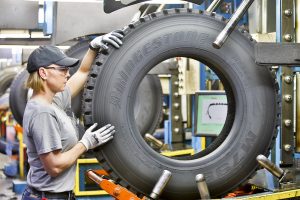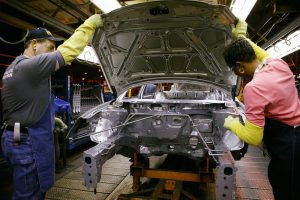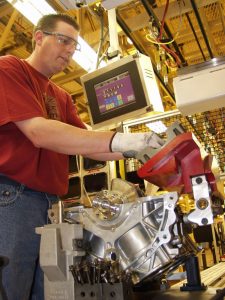We have talked about farming and mining. But farming and mining are only a small percentage of Tennessee’s products.
Today, most people make their living making things or producing a service for other people. And although this falls more in the category of economics than it does geography, it is very important to mention this when you talk about the basic products of Tennessee.
Not long ago there wasn’t much of a car industry in Tennessee. If you bought a car in the 1970s, chances were that practically none of the car parts were made in Tennessee, or made in the South for that matter. Automobiles and automotive parts were made in the northeast, with the industry centered in Detroit, Michigan.
This began to change in 1980, when Nissan announced it was building a truck assembly plant in Smyrna.
A few years later General Motors announced it was building a plant in Spring Hill that would build a new brand of car called Saturn.
These two announcements helped shift the auto industry southward. Today nearly every car manufacturer has a large assembly plant in the southeast United States. At these plants, thousands of individual parts are put together and made into cars. Meanwhile, the parts themselves are made at manufacturing plants all over the place.
Here are five examples of car parts plants in Tennessee:
* In Decherd (Coffee County), 1,400 people work at a plant that makes engines for Nissan cars and trucks.
* In Lawrenceburg (Lawrence County), about 700 people work at the DURA Automotive Glass plant, making car and truck windows.
* In La Vergne (Rutherford County), nearly 2,000 people work at a Bridgestone/Firestone plant making truck and car tires.
* In Bristol (Sullivan County), an estimated 755 people work at Exide Corporation, which makes car and truck batteries.
* And in Pulaski (Giles County), 278 people make seat cushions at the Johnson Controls plant.
There are many more examples. Today the Tennessee Department of Economic and Community Development calcuates that there are nearly 130,000 Tennesseans employed in the auto industry. This number is (hopefully) going up, as the state continues to recruit auto industry jobs to Tennessee. But these jobs are highly sought after, and every other state around Tennessee tries to recruit some of the same companies.
So, the next time you are in a car or truck, look around at all the parts that you see — from the seat belt to the odometer to the little electrical connection used to power your cell phone. Chances are, there is a company in Tennessee that makes just about every one of these parts.
With few exceptions, these car part manufacturers are small divisions of large, international companies. And with few exceptions, they located their operations in Tennessee because of location: they wanted to be relatively close to the assembly plants that make cars, and they wanted to be relatively close to people who are buying all these cars. Because of its central location to the American public and because of good interstate highway access, a lot of automotive parts manufacturers have started operations in Tennessee.
In Part Eight of the Advanced Geography section we are going to talk about how geography can influence history. Click here.




